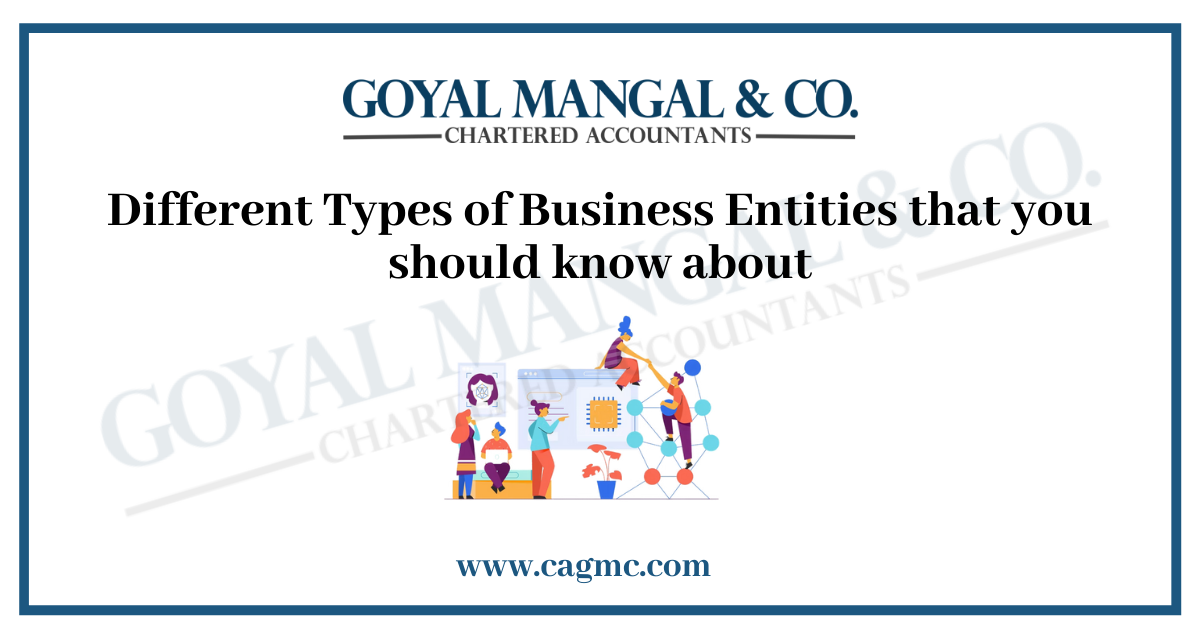
Business usually is an occupation or trade where one buys or sells products or services for profit. The term business usually refers to an organization that conducts commercial, industrial or professional activities. However, a business organization can be created for a purpose other than generating profits. In such a case, no part of the organization’s profit is distributed to the members, directors or officers. Such a business entity is known as a non-profit. In this article, we’ll discuss the Types of Business Entity in brief.
Business Entity
A business entity is an organization that is created by an individual or a group with the purpose of conducting business, engaging in trade, or such similar activities. It has a legal existence that is separate from its founders and owners. Which means, it has a clear identity of its own. Further, the organization is taxed separately as it’s considered a separate legal existence. There are many different types of business entities. Further, the Companies Act, 2013 governs the types of companies (Business Entity) that can be registered under it.
Importance of Business
Business is a major part of our daily lives. We spend most of the time in our lives conducting our businesses. They also help create innovations and advance technology. Business, in general, has largely shaped our society into what it is. In today’s world, the economy of each and every country is interconnected. It’s offering employment opportunities and generating wealth to improve the quality of life of everyone. It provides high-quality goods and services, to satisfy the people’s needs. Further, the Consumer Protection Act, 2019 looks to it that the businesses aren’t taking advantage of the people.
Types of Business Entity
Depending upon the type of entity that you choose for your business, the structure and the taxation for your organization will vary. The types of business entities are,
- Sole Proprietorship
- General Partnership
- Limited Liability Partnerships (LLP)
- Limited Liability Company (LLC)
- Corporation (C Corporation)
- Small Business Corporation (S Corporation)
- Public Limited Company
- Private Limited Company
- Joint-Venture Company
- One Person Company
- Non-Government Organization (NGO)
Sole Proprietorship
This is the simplest form of a business entity, with only one person as the sole owner and operator of the business with the objective of making profits. A sole proprietorship doesn’t have an existence apart from the owner. Hence, the business liabilities and the owner’s personal liabilities are intertwined. The business entity ceases to exist upon the death of the owner. The owner doesn’t need to register with the state to run a sole proprietorship. Some common examples of a sole proprietorship are freelancing, consultancy, retail store, etc.
General Partnership
A general partnership is similar to sole-proprietorship, with the key difference being that there is more than one owner of the business. Similar to a sole proprietorship there is no need to register the company with the government.
Limited Liability Partnership (LLP)
A LLP is a registered business. If you want to start a Limited Liability Partnership, you have to file paperwork with the state. In an LLP we can find two types of partners, General Partners, and Limited Partners. Further, the general partners are the ones who own and operate the business. So, they are the ones who are responsible for the liabilities. The limited partners are just investors, also known as “Silent Partners”. They don’t have any control over the business and have far fewer liabilities.
Limited Liability Company (LLC)
LLCs are more like partnerships and sole proprietorships. Therefore, we could call it a hybrid between the two. Further, in an LLC you have a choice of the tax structure of your business. You’ll have to do lesser paperwork than the other forms of corporations. Further, the members of an owner have the flexibility to its operations and income benefits.
Corporation (C Corporation)
A corporation has a separate legal entity. Further, it operates under state law. You must file an article of en-corporation with the state to establish a corporation. Also, the shareholders (owners), a board of directors, and officers have control over the corporation. However, only one person can fulfill all those roles. Therefore, only one person can create and operate a corporation.
Small Business Corporation (S Corporation)
Like C Corporation, an S Corporation is also a separate legal entity. However, it has special tax benefits. The corporate taxes of an S Corporation are dismissed if certain requirements are met. This means the taxes will be incorporated into the owner’s personal income tax.
Public Limited Company
In India, a Public Limited Company in India has a minimum of three directors and a minimum of seven shareholders. However, the number of shareholders can be unlimited. Further, you may or may not list it on the stock exchange. It also has a separate legal existence.
Private Limited Company
In India, a Private Limited Company can have only one single shareholder and a maximum of fifty shareholders. Further, they need to have at least two boards of directors and up to a maximum of fifteen. However, unlike Public Limited Companies they can’t publicly trade their shares.
Joint-Venture Company
A Joint Venture is a partnership between foreign and Indian investors. It offers the investors an opportunity to jointly manage the risks involved in the business. Further, the foreign investor also brings with them an established contact network, distribution, and marketing channels.
One Person Company
One Person Company has been introduced to India in 2013. Further, you can only start it if you are an Indian citizen. Further, you will be the sole owner of the business. This encourages entrepreneurs to start their own companies. Like other private companies, this also has a separate legal entity
.Non-Government Organization (NGO)
It is a non-profit organization that operates separately from the government. Further, it is a citizen-based association. Usually, NGOs serve some social cause.
Conclusion
The different types of businesses serve different purposes. Each has its own advantages and disadvantages. When you’re trying to start your own business you must be careful about which type of business it is that you’re registering. That would change the tax structure and the way you have to operate your business. In conclusion, the type of business that we register makes a lot of difference.


